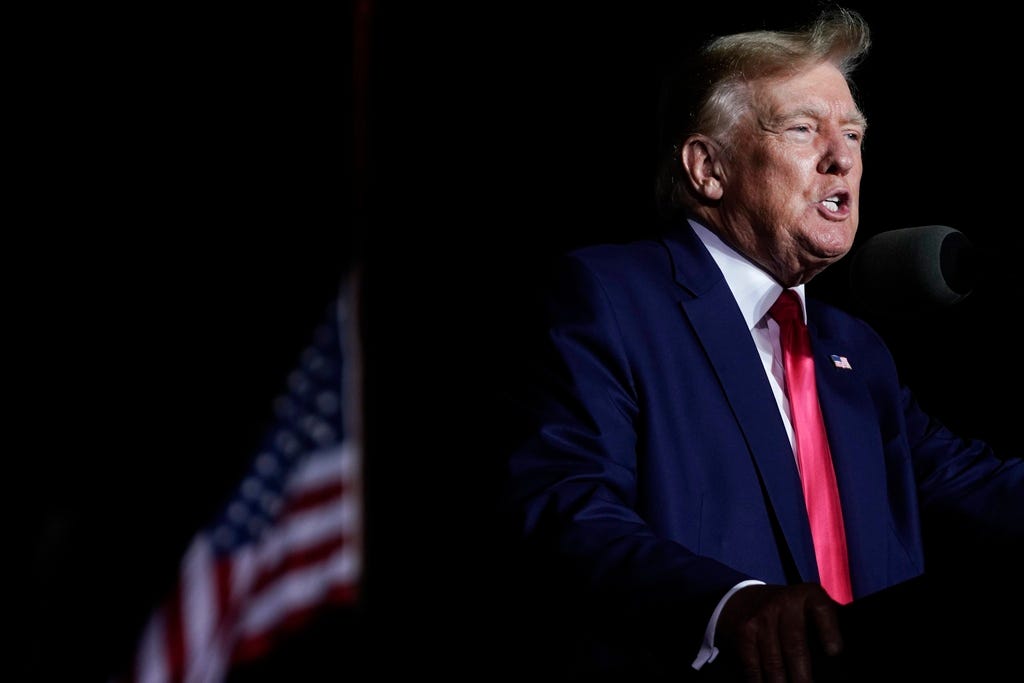- Some members of Trump's team want to restructure the Federal Reserve, the WSJ reported.
- That could include allowing the president to have a direct say on interest rate decisions.
- It would also allow him to get rid of Fed Chair Jerome Powell before his term ends in 2026.
The nation's central bank might look quite different if former President Donald Trump wins the upcoming election.
The Wall Street Journal reported on Thursday night that members of Trump's team are creating plans that would restructure the Federal Reserve and allow Trump to influence the Fed's actions, according to people familiar — a move that would erode the Fed's independence from political entities.
According to the Journal, the proposals would give Trump a say on interest-rate decisions, along with giving him the authority to oust Fed Chair Jerome Powell from his position before his term is up in 2026.
Trump's advisors cautioned that the campaign has not confirmed these plans:
"Let us be very specific here: unless a message is coming directly from President Trump or an authorized member of his campaign team, no aspect of future presidential staffing or policy announcements should be deemed official," Trump senior advisors Susie Wiles and Chris LaCivita told the Journal.
The Journal also reported that the proposal would require the Fed to be subject to review by the Office of Management and Budget when issuing new rules — a process that other federal agencies have to undergo and would be another effort to diminish the central bank's independence on matters of banking regulation.
Trump has previously been critical of Powell's handling of interest rates during the pandemic. To help the Fed achieve its 2% inflation target, the Federal Open Market Committee has hiked interest rates 11 consecutive times since March 2022. In September, the Fed paused the hikes and held rates steady since then, and Powell has emphasized the importance of being confident in economic data before cutting rates this year.
Trump hasn't been on board with Powell's timing. In Februrary, Trump told Fox News that Powell is being "political" by potentially choosing to cut rates right around the time of the presidential election.
"I think he's going to do something to probably help the Democrats, I think, if he lowers interest rates," Trump said, adding that "it looks to me like he's trying to lower interest rates for the sake of maybe getting people elected."
Powell has long maintained that the Fed is not a political entity, saying during an April discussion that "our analysis is free from any personal or political bias, in service to the public."
"We will not always get it right — no one does," he said. "But our decisions will always reflect our painstaking assessment of what is best for our economy in the medium and longer term — and nothing else."
None of this can be done without Trump back in the White House
The former president is the Republican Party's presumptive nominee, having handily defeated Florida Gov. Ron DeSantis, former South Carolina Gov. Nikki Haley, entrepreneur Vivek Ramaswamy, and others in the ongoing GOP primary election.
Despite many polls showing Trump ahead of President Joe Biden in head-to-head matchups, the outcomes change when 3rd party candidates are introduced into the mix, especially Democrat-turned-Independent Robert F. Kennedy Jr.
After losing to Biden in 2020, Trump has an unexpected advantage this time around: much more interest from young voters than before. Biden previously led Trump with the group by a nearly 20-point margin, but recent polls show that lead has fallen to just 1 to 2 percentage points.
There is, however, a catch: younger voters are historically much less likely to vote than older ones, and several GOP-led state legislatures introduced bills in recent years restricting which forms of identification can be used at the voting booth, which could further reduce young voter turnout.
Trump has also been hampered in recent weeks by his many legal troubles, such as the ongoing hush-money case in New York and his team's appeal to the Supreme Court on Thursday to give presidents sweeping immunity for their actions in office.
